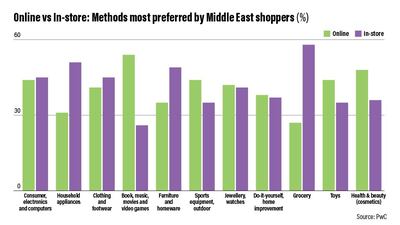With Christmas around the corner and high UAE retail prices, more and more residents are turning to online shopping to buy their presents, clothes and electric goods. Competition is heating up among e-tailers for market dominance, and it will translate to cheaper, faster products and services for consumers.
Abu Dhabi resident Nicole Adoranti has been turning to the web for more purchases driven by convenience and deals. “However, if I need an item faster, I’ll purchase in-store here,” she said.
Locally, she shops from websites such as Lulu’s to meet household needs, but turns to US shops to buy apparel. “I purchase clothes from random places in the US because even with shipping, it’s much cheaper [than items in UAE stores] when you find sales,” she said.
Recently a Dh210 sweater from the local branch of Destination Maternity caught her eye. She tried it on in the store, but decided to check the US website where it was on sale. “ I grew up going to garage sales, not the mall - and I’m an active deal finder,” she said.
By using Aramex’s Shop and Ship service, the same sweater was nearly 40 per cent cheaper than if Ms Adoranti had purchased it in the UAE outlet.
And this is exactly what shipping company Aramex is looking to tap in to. Hassan Mikail, chief e-commerce officer at Aramex, said of Shop and Ship customers that they are physically located here, but their mind is somewhere else. “Shoppers are looking for deals, the latest releases and more options,” he said. “They're looking at global trends.”
Shop and Ship is a service that allows members to order from global websites and have items delivered to an address in 24 cities across the globe. This opens the door for customers to take advantage of free shipping, which is prevalent for US offerings, while paying a fee based on weight to have the items then shipped to your country of residence.
The service has grown from its early days of offering an in-store catalogue which allowed customers to place orders through the shipping company in 2001. Now with more than 1 million members sprinkled across 60 cities, the GCC dominates as there is “more appetite for importing”, Mr Mikail said.
He said Shop and Ship really began scaling nearly a decade ago and has seen double digit growth year-on-year, with the average spend per use totaling US$119 per customer.
Yet the recent surge in online sales has forced the company to come up with innovative solutions to attract consumers. Since October they have offered a flexible programme where members are charged per 100 grams. “The UAE is the leader of the pack for members choosing this option and it’s changing consumer behavior, with people buying lighter-weight items,” he said.
This has grabbed customers like Omair Saya, who ventured into online shopping in 2013 while in Canada. The Dubai resident now makes 70 per cent of his purchases via the internet. Most recently, he decided to upgrade his phone and wanted the latest device from Google, which wasn’t yet available in the UAE.
_________________
Read more:
E-tailer Noon launches in Saudi Arabia
America’s Black Friday shopping craze spills over into the UAE
_________________
“I could pay directly from the US Google store using my UAE credit card,” he said. Google provided free local shipping, so Mr Saya used his Aramex address in the US. It cost Dh40 to have the package delivered to Dubai thanks to the new flexible shipping rates.
Consultancy PwC Middle East said in its retail report released this summer that mall operators may begin offering rent reductions to retailers to remain competitive, as well as franchise agreements, including online retail. The report said: “We believe retailers will move away from traditional transaction-based retail to one of a personalised ‘showroom’ customer experience.”
However, Aramex may face more pressure with the onset of Souq.com’s tie-up with Amazon, which this week opened up direct access for UAE patrons to shop the US Amazon store.
Norma Taki, head of retail at PwC Middle East, said that the presence of Amazon in the region was likely going to disrupt other players while enhancing the online experience to end customers.
“The percentage of online shoppers in the Middle East should be greater but shoppers in the region are demanding added value such as next day delivery and convenient options for unsuitable goods to be returned. These are things that Amazon provides.”
Ronaldo Mouchawar, co-founder and chief executive of Souq.com, said that its latest integrated service is price competitive, offering less steps, which cuts costs. “Orders are direct from one warehouse to customers, and we feel that when we compare shipping charges it is less because you’re touching the product less – it’s more streamlined,” he said.
The company has 1 million users, but expects this to increase as it grows its product selection. Souq.com believes that its Amazon Global Marketplace has two major selling points that differentiate it from others: direct access to overseas products and immediate, all-inclusive rates.
However, there are more players in the market, according to one events manager in Dubai. She uses Asos.com, a UK webstore specialising in fashion and beauty for 20-somethings, which offers more than 80,000 branded and own-brand products. More importantly for her is that Asos ships to Dubai for free for items over £20.00 as well as free returns.
“Excluding groceries, I do about 80 per cent of all my shopping online,” she said, preferring not to be named. She chooses to buy the majority of her clothes via the internet. “Clothes from shops in Dubai are ridiculously inflated,” she said.


